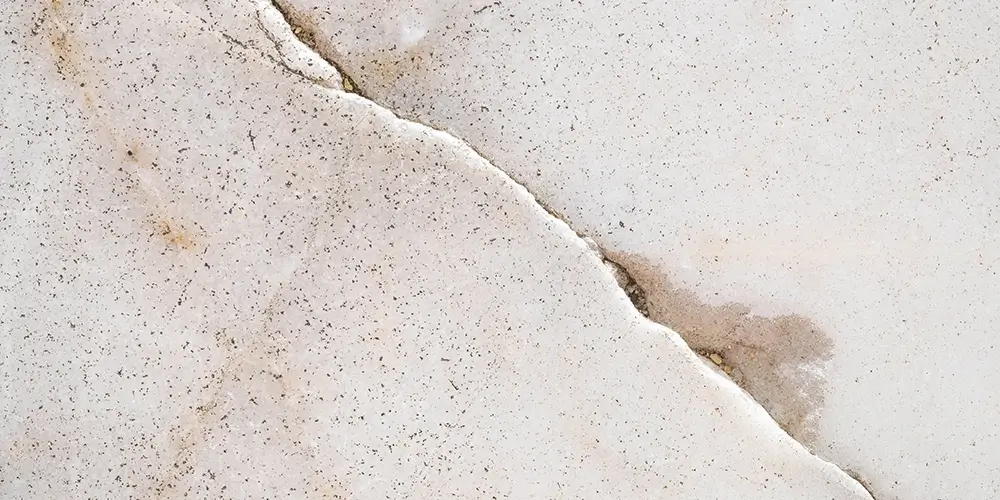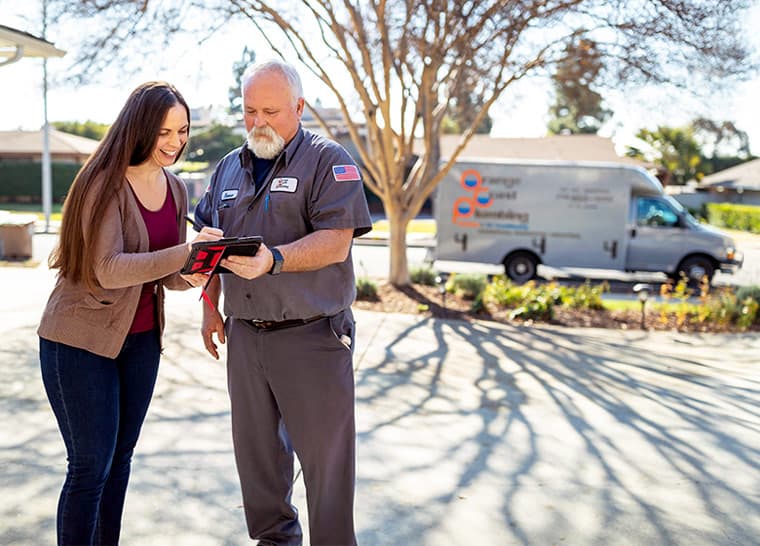Slab leaks — those words should strike fear into any homeowner’s heart. They often happen without warning. They can cause massive damage and even render your home uninhabitable. On a scale of 1-10 for plumbing disasters, they’re a 12.
But what exactly causes these apocalyptic leaks? And more importantly, what can you do to prevent them?
What’s a Slab Leak?
A slab leak is exactly what it sounds like — a leak in the water lines in or beneath your home’s concrete slab foundation.
They usually start small, even undetectable, without special equipment, but can quickly escalate into a flood. Even short of flooding, a slab leak can ruin a home’s foundation, feed mold growth, and create warm, damp breeding grounds for pests like termites.
Some causes are apparent, like corroded pipes. Others, like shifting soil, can be hidden beneath the surface for years, slowly undermining your home.
Common Causes of Slab Leaks
1. Poor Installation
If the pipes were incorrectly installed or subpar materials were used, you could face problems. For instance, poorly soldered joints or improperly fitted pipes can weaken over time, leading to leaks.
What to do:
- Consult a professional plumber to assess and repair the issue. It might involve rerouting or replacing sections of your plumbing, but it’s worth it to prevent future leaks.
2. Shifting Soil
The concrete slab may crack or move as the ground shifts due to nearby construction, heavy rain, or drought. This shifting can stress or break the pipes running beneath it.
What to do:
- Be mindful of your landscaping. Proper drainage and soil stabilization can reduce the risk of shifts.
- Regularly inspect your home’s foundation for cracks or signs of movement. Early intervention is critical.
3. Pipe Corrosion
Metal pipes are always at risk of corrosion. They degrade due to chemical reactions with water or soil, leading to weak spots.
What to do:
- Consider replacing old metal pipes with newer, corrosion-resistant materials like PEX or PVC.
- If you have hard water, install a softener to slow the corrosion process.
4. Abrasion from Concrete
Believe it or not, the concrete slab meant to protect your pipes can also make them fail. When water pipes are laid directly on or through concrete, the constant friction between the pipe and the rough surface of the concrete can wear away the pipe material.
What to do:
- During construction, ensure that pipes are properly cushioned and supported where they contact concrete.
- If you suspect abrasion, a plumber can add protective sleeves around vulnerable pipes to prevent further damage.
5. High Water Pressure
We all know what high blood pressure does to veins and arteries. Constant high water pressure similarly affects pipes, putting them under excessive strain until they crack or burst.
What to do:
- Have a plumber test your home’s water pressure and make adjustments if necessary. Ideally, the pressure should be around 40-60 psi.
6. Tree Roots
Trees are lovely additions to the yard but a nightmare for your plumbing system. Their roots can infiltrate pipes as they grow, causing blockages and leaks.
What to do:
- Be mindful of where you plant trees and your home’s plumbing lines. Opt for slow-growing species with shallow root systems.
- If you suspect a tree root invasion, have a plumber with specialized equipment clear the roots and repair the damage.
7. Construction Damage
With nearby digging, drilling, and other construction work, there’s always a chance of damaging buried pipes.
What to do:
- If possible, be present during construction work and ensure workers know where your home’s plumbing lines are.
- If damage does occur, immediately contact a professional plumber for repairs.
8. Freezing Temperatures
While uncommon in most areas of Southern California, freezing temperatures can wreak havoc on unprepared plumbing systems. Water expands when it freezes and can easily burst through pipes.
What to do:
- In freezing weather, leave a faucet dripping and open cabinet doors to allow warm air to circulate around pipes.
- If your area is prone to freezing temperatures, consider insulating exposed pipes or installing frost-proof outdoor faucets.
9. General Wear & Tear
Like any other household system, your plumbing will eventually wear out. This includes rubber seals, joints, and connectors that can dry out and crack or weaken with age.
What to do:
- If your home is older, it might be time to consider a whole-house re-pipe. It’s a big job, but it can save you from a devastating slab leak.
- Regular maintenance checks by a qualified plumber can catch minor issues and nip them in the bud.
10. Chemical Reactions
Factors like high water acid content, minerals like hydrogen sulfide or chlorine, and even bacteria can weaken metal pipes.
What to do:
- Regularly test your water quality to identify any corrosive elements. Hire a professional plumber or water quality expert for comprehensive analysis.
- Consider installing a water treatment system, such as a neutralizer or filtration unit, to regulate water chemistry and protect your pipes.
- For existing metal pipes, you might want to explore protective coatings that serve as a barrier against corrosion or opt for replacement with corrosion-resistant materials like PEX or PVC.
11. Earthquakes
Remember, we live in California. Strong earthquakes can cause significant damage to your home’s foundation and plumbing system.
What to do:
- Have a professional inspect your home’s plumbing lines after an earthquake to identify potential damage or weak points.
- Consider installing flexible pipes that are less prone to breaking.
How to Prevent a Slab Leak
- Schedule regular maintenance checks by a professional plumber. A trained eye can spot potential issues and keep them from escalating.
- Be mindful of what you put down your drains. Avoid disposing of oil, grease, coffee grounds, and other materials that can clog or corrode pipes.
- Monitor your water bill for any sudden spikes in usage or costs that could indicate a hidden leak.
- Watch for signs of a slab leak, such as damp spots on the floor or walls, hot spots on your floors, reduced water pressure, or the sound of running water when all faucets are turned off.
- If you suspect a slab leak, immediately contact a licensed plumber for repairs. The longer you wait, the more damage and costly repairs you’ll face.
FAQs: More about Slab Leaks
Q: How much does it cost to fix a slab leak?
The cost varies widely depending on the severity of the leak and the repair method. Minor repairs might cost a few hundred dollars, while major fixes, like re-piping, can run into the thousands.
Q: How long does it take to repair a slab leak?
That depends on the complexity of the repair. Simple repairs can be completed in a few hours, while more extensive work could take several days.
Q: Does homeowner’s insurance cover slab leaks?
Some policies cover slab leak damage, while others don’t. Always check with your insurance provider to understand your coverage.
Q: How long can a slab leak go undetected?
A slab leak can go undetected for weeks or even months, particularly if there are no visible signs. The longer it remains hidden, the greater the risk of damage to your home.
Q: What materials are most commonly used for plumbing pipes?
Copper, PVC, PEX, and polybutylene are common materials for plumbing pipes. Each material has advantages and disadvantages regarding cost, durability, and susceptibility to leaks.
Q: Can I fix a slab leak myself?
No, it’s not a DIY repair. Slab leaks require specialized equipment and expertise to identify, access, and repair the damage. Always hire a licensed plumber.


